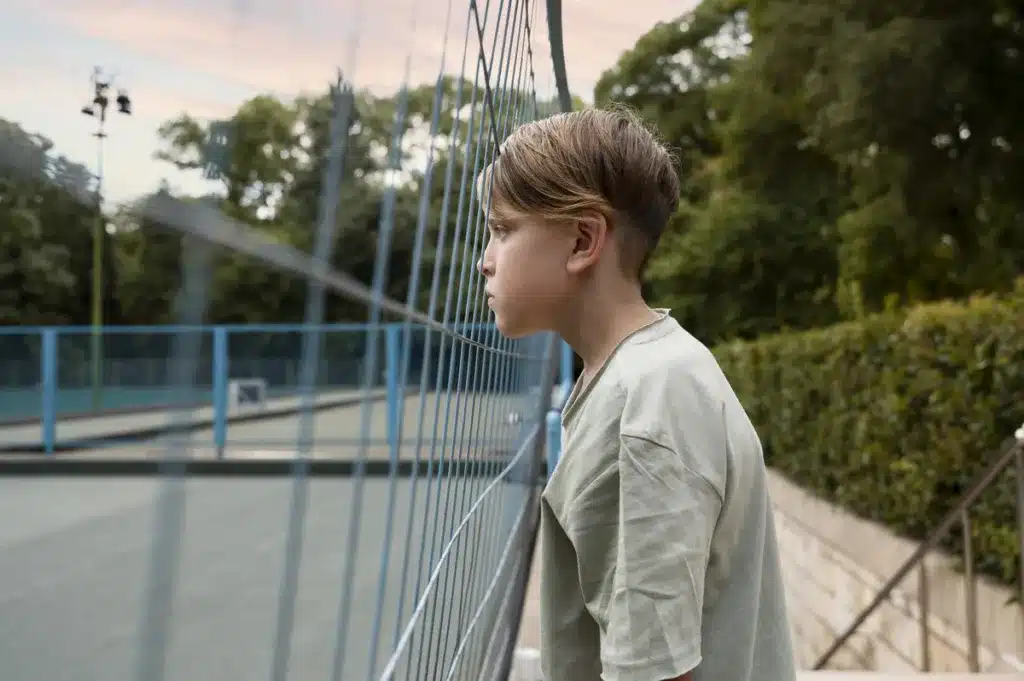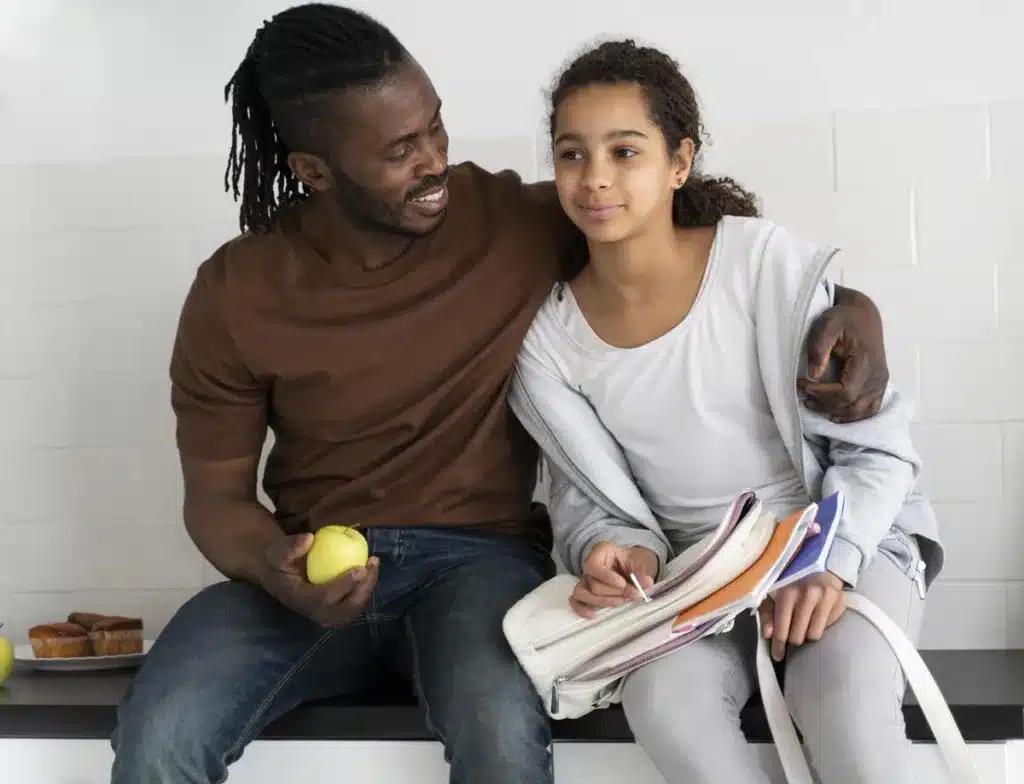“You’re the worst parent anyone could ever have. You don’t care about my happiness. Everyone will be at that concert except for this loser with the worst parents.” These are the words of 14-year-old Megan, but they could have been uttered by countless others before. You might say that she’s the universal teenager, embodying the angst and frustration that often characterize parent-child interactions during adolescence.
How do families end up in this tough spot? Is this just a normal part of growing up? Will we be drained out until the phase of rebellious behavior and mood swings passes? Read further and gain insights on teenage rebellion psychology, where it stems from, and what you can do about it.
The Complex Nature of Teenage Rebellion
Teenage rebellion is a phase that many parents dread. As preteens and adolescents start to explore their individuality, this can sometimes seem like they’re acting out just to defy their parents. In essence, however, the teenage years are a critical period for learning how to survive and thrive independently from parents. In many traditional societies, adolescence is the time when parents start relying on their kids to take on adult responsibilities.
Risky behavior and rebellion often stem from a combination of biological and environmental factors. During adolescence, the brain is still developing, particularly in areas related to judgment and decision-making. This development can lead to a natural inclination towards novelty and excitement, making risk-taking more appealing. Additionally, peer influence, societal pressures, and access to technology can contribute to risky behaviors, as teens may feel the need to fit in or express their growing independence. In the broader context of human development, these behaviors may also reflect an innate drive to explore and innovate, which has been an essential part of human evolution.
Unraveling the Causes of Teenage Rebellion: Teenage rebellion psychology
Rebellion can stem from various factors, including their search for identity, peer influence, cognitive and emotional changes, perceived parental expectations, and stress. Here is a list of the most common causes for teenage rebellion:

Credit: Freepik
- Finding their own identity: During the teenage years, adolescents are trying to figure out who they are. This journey of self-discovery often involves testing the boundaries set by their parents as they seek to assert their independence. They might adopt new styles, question family values, or challenge family traditions, all in a bid to carve out their own identity.
- Friends and social acceptance: Friends start to play a more significant role in a teenager’s life as they grow older. Teens want to fit in and may adopt certain behaviors, attitudes, or activities that come from peer pressure or exposure to social media, even if these go against family norms. They might rebel against their parents’ rules that they feel intrude on their social life.
- Brain development and emotions: The teen years are a time of big changes in the brain and emotions. Their brains are still maturing, particularly the prefrontal cortex – the part responsible for decision-making and controlling impulses. This could lead to emotional outbursts and risky behaviors, which can look a lot like teenage rebellion.
- Battling parental expectations: Sometimes, teens feel pressured to live up to their parents’ expectations. If these expectations seem too high, or if they don’t match the teen’s own goals, they might act out in frustration and rebellion.
- Dealing with stress and mental health: Countless studies show that teenagers face a lot of stress, from high school to social issues, which can sometimes lead to anxiety and depression. Rebellion can be a way for teens to express their frustration or cope with these challenges
The Crucial Role of Parenting Styles

Credit: Freepik
The style of parenting a teen is exposed to can significantly influence the intensity and nature of their rebellion:
- Authoritarian parents have strict rules and want their children to obey them without question. If a child doesn’t follow these rules, they’re likely to be punished. For example, such a parent might have a fixed bedtime, and breaking this rule could lead to punishment like confiscation of devices. This style may spark rebellion as teenagers strive for autonomy and resist the rigidity of rules.
- Authoritative parents set rules too, but they’re also open and understanding. They talk with their kids, encourage independence, and explain the reasons behind the rules. For instance, an authoritative parent might set a curfew but explain that it’s for their teen’s health. This parenting style usually results in less rebellion because it fosters mutual understanding and respect between parent and child.
- Permissive parents don’t set many rules or expectations and give their teens a lot of freedom. They are more lenient and see accepting a child’s request as a straight path to their happiness. They might not mind if their teen parties on school nights. Although they’re seen as the ‘cool kids’ by their peers, this lack of structure may stimulate rebellious, attention-seeking, and risky behavior. This trajectory might continue into adulthood, affecting their self-esteem and well-being.
- Uninvolved parents tend not to respond to their children’s needs and may lack emotional involvement. For instance, they may miss parent-teacher meetings or forget their teen’s important life events. Such behavior can lead to rebellion, as teens may feel rejected. They may attempt to assert their worth or seek emotional support and authority figures elsewhere.
Communication Breakdown: A Barrier to Understanding
George Bernard Shaw’s famous quote, “The single biggest problem with communication is the illusion that it has taken place,” highlights a common complaint between parents and teenagers: both feel like the other isn’t listening.
When kids become teenagers, they start to think about big ideas and want to try new things. Sometimes, these ideas might seem too bold or risky to parents, and they might say no. This can lead to frustration and a feeling that they’re not being understood.
The solution? Active listening. Parents must learn to not only share their life wisdom but also to genuinely hear their teens. It’s a delicate balance between offering guidance and allowing your teen to explore their thoughts and make some decisions. The way parents talk to young children doesn’t always work with teenagers. You can’t just tell them what to do and expect them to follow without question. They’re growing up, and they want their opinions to be heard. It’s like changing from being the boss to being a guide. Encourage them to gather information from trustworthy resources and always think things through.
In other words, it’s time to talk with your teen, not just to them. It can be a big change, but it’s an essential step in growing a relationship that will last into adulthood. You want to be connected with your teen, have a healthy relationship, and not just be in charge of them. This two-way communication builds trust, respect, and understanding that can last a lifetime while also reducing the risk of teenage rebellion.
👉 Is your teenager experiencing anger outbursts? Discover the top causes of anger in kids and effective solutions for parents in our article! Don’t miss out on valuable insights to help your child thrive. Read now!
Navigating Conflict and Setting Boundaries
Teenagers are growing up, and they often want to take more control over their lives. This can be a challenge for parents trying to find the right balance between giving their teens freedom and keeping them safe. Most parents will try to avoid conflicts with their kids, but that is not always possible. It’s not even healthy, for that matter. Conflict has its purpose in every relationship. It brings out unsettled things and gets us closer to finding a solution.
Some parents try to be more like friends with their teens, thinking this will help them stay connected. While it’s good to have a close relationship, being a parent is different from being a friend. Parents still need to set rules and boundaries. Trying to act like a friend can confuse the relationship and make it harder to enforce rules.
Other parents might become stricter and more controlling as their child grows up. This can lead to creating a rebellious teen and a relationship where power struggles and resistance are common. If a parent was more relaxed when the child was younger and suddenly becomes very strict, it can feel unfair for the kid.

Credit: Freepik
The key is to find a middle ground. Boundaries should change and adapt as a child grows, and parents need to explain the reasons behind the rules. Being clear and consistent helps teenagers understand what’s expected of them. For example, some parents might decide they won’t nag about small things like keeping a tidy room but will be firm about rules like curfews and homework. This approach respects the teenager’s growing independence while keeping essential boundaries in place. It’s about choosing the right battles and being clear about what’s negotiable and what’s not.
Coping Strategies for Parents: From Conflict to Connection
Parenting a child in their teen years can get pretty confusing. Everything happens so fast. It’s like they fell asleep playing ‘the floor is lava’ and woke up the next day to go on their first date. While they might seem like an entirely different species, teenagers are the same children at heart. Navigating this delicate period doesn’t require intricate strategies or undercover operations to check their phones or monitor their friendships; there are simpler, healthier ways.

Credit: Freepik
Stay present in their lives and spend quality time together. It’s normal for teenagers to prefer spending time with friends over their parents, but when they’re at home, make sure they feel safe and loved. Engaging in shared activities, like sports, can help you bond. Sports can also discourage risky behaviors and rebellion, which are common during this phase. Sports give them a healthy way to compete and use their energy.
If you’re not much on the sporty side, be consistent with family activities like board games, cooking sessions, gardening, woodworking, or any activity that you share an interest in. If you extend the invitation to your child’s friends, it’s even better for connecting to their world.
Another strategy that can help parents better handle the rollercoaster of the teen years is seeking support from other parents or joining parenting support groups. Sharing experiences and tips with others going through the same thing can provide much-needed reassurance and guidance.
When to Seek Professional Help
It’s scary to see your child slowly drifting away from the values you struggled to instill. This situation can often lead to feelings of parental guilt and fear of failure. Are you doing enough? Have you failed as a parent? Are all the teenage rebellion examples you witness in kids that hang out with yours going to stick? These are tormenting questions that many parents wrestle with. Even with the best intentions, it’s true that it doesn’t always lie in our efforts to keep things on track. Peer pressure is a very strong force acting on our children, and at times, parental efforts may not be enough to address teenage rebellion.
When a teenager starts engaging in risky behavior, such as substance abuse, self-harm, or other acts that deviate from their typical behavior pattern, it might indicate underlying emotional or behavioral issues that are beyond what parental guidance can manage. Other warning signs might include drastic changes in social life, withdrawal from family activities, a sudden drop in grades, or unexpected mood swings.
In these situations, seeking assistance from therapists, counselors, or mental health professionals can be beneficial. These experts are trained to identify and work with underlying issues that may be driving these concerning behaviors associated with teenage rebellion. The benefits of professional help include personalized strategies tailored to your child’s specific situation. Health care professionals can offer support for the entire family in navigating these complex challenges. They can also help in addressing mental health issues that may be hidden beneath the surface.
👉 Sometimes, you’ll have to refuse your teenager, but it’s crucial how you do it. Learn how to say no without actually saying no by reading our article on “Why it’s better to say NO in a positive way to your child & 5 ways you can do this.” Enhance your parenting skills and build a stronger connection with your child.
Conclusion
Teenage rebellion is a complex and challenging phase for both parents and adolescents. It’s essential for parents and caregivers to approach it with empathy, kindness, and open communication. It’s vital to recognize that these years are not only hard for adults but also for teenagers who struggle to understand the changes in their bodies and minds.
Stay alert to signs of underlying issues but remember to address them with compassion. Don’t hesitate to seek professional help if needed, as therapists and counselors can provide valuable support. By working together and prioritizing mental health and physical well-being, families can navigate the teenage years with understanding and connection, fostering relationships that thrive.
Whether they’re three or thirteen, some behaviors children engage in can challenge even the most patient parents. Join our online parenting event, “3 Methods to Get Your Children to Listen,” and discover teenage rebellion psychology, as well as practical strategies to enhance communication and cooperation within your family. Sign up today and transform the way you connect!
Thought of a question while reading this article? Our friendly AI assistant, Sophie, is ready to share her thoughts on any parenting question you might have.
References
Branje, S., Laursen, B., & Collins, W. A. (2012). Parent–child communication during adolescence. In The Routledge Handbook of Family Communication, 271-286. https://doi.org/10.4324/9780203848166
Jaccard, J. (2016). The Prevention of Problem Behaviors in Adolescents and Young Adults: Perspectives on Theory and Practice. Journal of the Society for Social Work and Research. https://doi.org/2334-2315/2016/0704-00XX$10.00
Refanthira & Hasanah. (2020). Adolescent Problem in Psychology: A Review of Adolescent Mental Health Studies. Proceedings of the 5th ASEAN Conference on Psychology, Counselling, and Humanities. https://doi.org/10.2991/assehr.k.200120.004.
Romeo, R. D. (2013). The Teenage Brain. Current Directions in Psychological Science, 22(2). https://doi.org/10.1177/0963721413475445
Wang, T., & Kenny, S. (2014). Longitudinal Links between Fathers’ and Mothers’ Harsh Verbal Discipline and Adolescents’ Conduct Problems and Depressive Symptoms. Child development, 85(3), 908. https://doi.org/10.1111/cdev.12143
Zhang, Q., Pan, Y., Zhang, L., & Lu, H. (2021). Parent-Adolescent Communicatio and Early Adolescent Depressive Symptoms: The Roles of Gender and Adolescents’ Age. Frontiers in Psychology, 12, 647596. https://doi.org/10.3389/fpsyg.2021.647596









